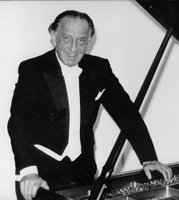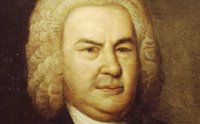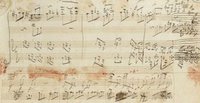Thursday, December 15, 2005
Norman Lebrecht from La Scene Musicale has thoroughly discredited himself and, also, caused an outcry of outrage on message boards and blogs all over with his recent article entitled "Too much Mozart makes you sick."
Lebrecht shows that he is completely unfamiliar with the works and history of Wolfgang Amadeus Mozart. His article is full of inaccuracies. He goes as far as to state that Mozart's music is "lively, melodic and dissonance free." Has he only listened to Eine Kleine Nachtmusik?!? I'd love to know how few of Mozart's works Mr. Lebrecht has heard to make such a blanket generalization. After all, Mozart wrote a string quartet that is called the "Dissonance quartet!"
Even more outrageous is Mr. Lebrecht's statement that Mozart "failed to take music one step forward." What a preposterous thought! Mozart excelled in every form of music he tried his hand at. For instance, he practically invented the Piano Quintet. His combinations of instruments and expirementation with various forms of music were extremely unique and carried an enormous amount of influence on to future generations of composers.
Mr. Lebrecht appears to hold Haydn in high regard saying that he "invented the sonata form without which music would never have acquired its classical dimension." Well, Mr. Lebrecht, did you know that Haydn himself said that Mozart was the greatest composer known to him and that Mozart had the most profound knowledge of composition. Could Haydn have not known what he was talking about, Mr. Lebrecht?!
Apparently, Mr. Lebrecht has only given the music of Mozart a very shallow, surface listening at best. He claims that "Mozart merely filled the space between staves with chords that he knew would gratify a pampered audience. He was a provider of easy listening, a progenitor of Muzak." Completely false!! Perhaps that is the beauty of Mozart's music. Many times the most simplistic sounding passages hold much more complexity than the listener actually realizes only to be discovered upon closer inspection. If Mr. Lebrecht would have done his research, he would know that much of Mozart's music was considered by audiences who first heard it to be too complex and contain too much dissonance. Mozart did not "pamper" the audience, and felt that it would be a disservice to his art to do so!
Lebrecht mentions Dmitri Shostakovich saying that he is "a composer of true courage and historical significance." Sure, Shostakovich was a true talent, but to say that he has more "historical significance" than Mozart?!? Lebrecht has leaped off the cliff of absurdity and has fallen flat on his face with his crazy assertions.
However, Lebrecht saves his most shocking statements for last saying that "Mozart has nothing to give to mind or spirit in the 21st century. Let him rest." I think you should give it a rest, Mr. Lebrecht! Perhaps you wrote this article with the intention of shocking readers and taking an opposite stance to almost every musicologist, philosopher or previous composer that ever lived. For you would be hard pressed to find any composer that did not regard Mozart as the supreme figure of musical history.
Certainly, you have garnered a lot of attention for yourself. However, I bet this wasn't the kind of attention you wanted. You have discredited yourself in my eyes and in those of pretty much every other reader who knows anything.
Thus, Mr. Lebrecht, my stance is that Mozart will have plenty to give to the mind and spirit in the 21st century whereas you have nothing but nonsense and ignorance to contribute. So perhaps you are the one who should be "left to rest."
Other reactions can be found at:
Classical Watch
The Mozart Forum
The Classical Music Guide Forums
 Labels: Mozart |
Subscribe:
+Yahoo
|
+Newsgator
|
+Bloglines
|
+Rojo
|
+Google
|
+Newsburst
|
+AOL
|
+MSN
|
+Blogroll
Translate: Español | Deutsche | Français | Italiano | Português
Wednesday, December 14, 2005

Gone is another of the world's best pianists. Gyorgy Sandor died at the age of 93 from heart failure at his home in Manhattan.
Sandor was a pupil of Bela Bartok and one of the biggest champions of the Hungarian composer's works. He also studied composistion with Kodaly at the Liszt Academy of Music in Hungary. He settled in the United States after his Carnegie Hall debut in 1939.
He had a wide repertoire, but his best recordings were those of Bartok, Kodaly and Prokofiev. In 1965, he won the Grand Prix du Disque for his recordings of the piano music and concertos of Bartok. He premiered many of the works of Bartok including his Piano Concerto No. 3.
He was also an influential teacher, having taught at Southern Methodist University, University of Michigan at Ann Arbor and Julliard.
 |
Subscribe:
+Yahoo
|
+Newsgator
|
+Bloglines
|
+Rojo
|
+Google
|
+Newsburst
|
+AOL
|
+MSN
|
+Blogroll
Translate: Español | Deutsche | Français | Italiano | Português
Tuesday, December 13, 2005

When I go to the gym, I usually just listen to whatever they are playing no matter how bad it is because I'm too cheap to buy an mp3 player. I do wonder though what I would listen to if I did have one. I love Classical Music, obviously, but I wonder what kind of workout companion it would be.
The Well-Tempered Blog highlights an article about just that.
The article, written by Wayne Lee Gay for the Star-Telegram gives some prime examples for music to listen to while exercising. The focus is on what is good to listen to while doing cardio.
You'll find at the top of the list Rachmaninoff's works for piano and orchestra, a fine suggestion in my book! Other suggestions for cardio include Elgar's Introduction and Allegro for Strings, J.S. Bach's keyboard concertos, Ernest Bloch's Concerto Grosso No. 1 for Piano and Strings, and Howard Hansen's symphonies.
He also gives some fine suggestions for music to listen to while doing meditation-based exercises such as Yoga or Tai-Chi. Once again with Rachmaninoff, he suggests the Preludes for piano. Who knew that Rachmaninoff was so conducive to exercising?! Joplin's Piano rags are his other choice.
These all sound like great ideas to me, but what about those who are weightlifting. Probably something dramatic like a Sturm and Drang symphony would be good. Anyone else have any ideas?
[From The Star-Telegram]
 |
Subscribe:
+Yahoo
|
+Newsgator
|
+Bloglines
|
+Rojo
|
+Google
|
+Newsburst
|
+AOL
|
+MSN
|
+Blogroll
Translate: Español | Deutsche | Français | Italiano | Português

Do you have a tune or melody stuck in your head and you can't figure out what it is? Enter Musipedia, a searchable collection of tunes, melodies and musical themes.
There is nothing more annoying than having a melody stuck in your head and not knowing what is it is!! Musipedia has saved me from such delerium numerous times since I discovered it.
From Musipedia's site:
"Musipedia uses the "Melodyhound" melody search engine. You can find and identify a tune even if the melody is all you know. You can play it on a piano keyboard, whistle or sing it to the computer, or directly use the Parsons code. To "name that tune", you don't need to know the key signature, exact rhythm, or intervals." The more of the melody you can input the better your results will be.
So give Musipedia a try today. |
Subscribe:
+Yahoo
|
+Newsgator
|
+Bloglines
|
+Rojo
|
+Google
|
+Newsburst
|
+AOL
|
+MSN
|
+Blogroll
Translate: Español | Deutsche | Français | Italiano | Português
Monday, December 12, 2005

As the BBC gears up for their Bach Christmas spectacular beginning on December 16th, I suggest you check out the nifty Bach Advent Calendar.
To quote the BBC's site:
"BBC Radio 3 will be celebrating Christmas 2005 by broadcasting continuously over ten days the complete works of Johann Sebastian Bach.
The composer's entire surviving body of work will be performed by some of the world's greatest musicians including specially recorded performances by Sir John Eliot Gardiner, Angela Hewitt, Philippe Herreweghe and Ton Koopman."
How exciting is that?!
The main site can be found here.Labels: Bach |
Subscribe:
+Yahoo
|
+Newsgator
|
+Bloglines
|
+Rojo
|
+Google
|
+Newsburst
|
+AOL
|
+MSN
|
+Blogroll
Translate: Español | Deutsche | Français | Italiano | Português
Friday, December 09, 2005
The Grammy nominations list was released yesterday.
Here is the link to go straight to the Classical nominations.
I love how they put it at the very bottom of the category listings as if it is some kind of afterthought. I don't see why Rap and Polka should be listed before Classical Music!! I would venture to say that rap isn't even music.
Do they even show the Classical awards given out on the program? I don't think they do. To think of they types of music that are more popular than Classical is quite upsetting. |
Subscribe:
+Yahoo
|
+Newsgator
|
+Bloglines
|
+Rojo
|
+Google
|
+Newsburst
|
+AOL
|
+MSN
|
+Blogroll
Translate: Español | Deutsche | Français | Italiano | Português
Tuesday, December 06, 2005

It took one of the most powerful X-Rays in the world, but scientists were able to prove conclusively at last that Ludwig van Beethoven died from lead poisoning. They focused the beam on six pieces of his hair and small fragments of his recently discovered skull.
The study took place at the Energy Department's Argonne National Laboratory outside of Chicago. It had long been speculated that lead poisoning could have been the cause of Beethoven's death. What is uncertain is how Beethoven came to be exposed to such great amounts of lead. It is possible that the source was his lead drinking cups which he frequently drank wine from. Another possibility is that the lead came from medical treatments which he received. Treatments from the 19th century frequently contained traces of heavy metals such as lead. Also, the actual containers for the medicines back then were frequently leaded glass bottles.
Another important finding was that there was no mercury present. This further discredits the theory that Beethoven had syphilis which was treated with mercury in those times.
Beethoven's hair samples contained 60 parts per million of lead. This is 100 times higher than the normal amount found in most humans.
As early as his twenties, Beethoven started to have medical symptoms that indicated he may have lead poisoning such as severe stomach problems. By his late twenties Beethoven was deaf. However, it is not believed that the lead poisoning brought about the deafness.
And so, at last, the long speculated cause of death has been answered for this great composer. Now, if only we could figure out the cause of Mozart's death!
[From The Washington Post]
 Labels: Beethoven |
Subscribe:
+Yahoo
|
+Newsgator
|
+Bloglines
|
+Rojo
|
+Google
|
+Newsburst
|
+AOL
|
+MSN
|
+Blogroll
Translate: Español | Deutsche | Français | Italiano | Português
Monday, December 05, 2005

Get out your recording of Mozart's Requiem and give it a spin, for on this day in 1791 Wolfgang Amadeus Mozart passed away.
"Lacrimosa dies illa, Qua resurget ex favilla Iudicandus homo reus." - "Ah! That day of tears and mourning! From the dust of earth returning man for judgement must prepare him."
Mozart died around 1 A.M. while working on the very Requiem I have just quoted. An eerie thought indeed, to think of Mozart working on a death mass as he died.
The cause of Mozart's death is somewhat of a mystery although many scholars agree that it was probably Rheumatic Fever. Likewise, most scholars agree that it is preposterous to think that Salieri poisoned Mozart.
So, Requiem Aeternam, Dear Mozart, For your music lives on!Labels: Mozart |
Subscribe:
+Yahoo
|
+Newsgator
|
+Bloglines
|
+Rojo
|
+Google
|
+Newsburst
|
+AOL
|
+MSN
|
+Blogroll
Translate: Español | Deutsche | Français | Italiano | Português
Sunday, December 04, 2005
Everyone is well aware of the fact that in general today's youth seem to be pretty uninterested in Classical Music. This worries me as Classical Musicians are aging fast and someone needs to step in eventually to fill their shoes.
The El Paso Symphony Orchestra may have the solution to get today's youngsters involved in the music making process. They have announced that they will be starting three youth orchestras.
There will be three ensembles:
The El Paso Youth Orchestra for the most experienced musicians aged 14-23.
The El Paso Youth Symphony is a full-orchestra for musicians of intermediate experience older than 11.
And the El Paso Youth String Ensemble is a string group for musicians with very limited ensemble experience.
Benjamin Loeb, music director of the El Paso Youth Choir and a piano teacher at the El Paso Conservatory of Music, will lead the ensembles.
Hopefully this trend will catch on and spread to cities all throughout the United States and help bring about a whole new generation of Classical Music lovers.
[From The El Paso Times]
 |
Subscribe:
+Yahoo
|
+Newsgator
|
+Bloglines
|
+Rojo
|
+Google
|
+Newsburst
|
+AOL
|
+MSN
|
+Blogroll
Translate: Español | Deutsche | Français | Italiano | Português
Thursday, December 01, 2005

The recently discovered Beethoven score that I posted on in Ludwig van Beethoven's Lost Manuscript has been sold at auction for an astonishing 1.9 million dollars.
An anonymous buyer bought the score that was expected to go for up to 2.6 million dollars.
The "Grosse Fuge" was written by Beethoven in 1826, a year before his death. The manuscript contains numerous corrections and deletions by the composer providing an insight into the manner in which he composed.
The last time the manuscript was seen in public before its July discovery at the Palmer Theological Seminary was at an 1890 Berlin auction.
This falls far short of the record price paid for a Beethoven score. In 2003, a working manuscript for Beethoven Ninth Symphony was purchased for about 3.6 million dollars. A small price to pay for such a monumental work.
[From BBC News]
 Labels: Beethoven |
Subscribe:
+Yahoo
|
+Newsgator
|
+Bloglines
|
+Rojo
|
+Google
|
+Newsburst
|
+AOL
|
+MSN
|
+Blogroll
Translate: Español | Deutsche | Français | Italiano | Português













Comments on "Lebrecht Says Too Much Mozart Makes You Sick"
-
 Anonymous said ... (10:33 AM, December 16, 2005) :
Anonymous said ... (10:33 AM, December 16, 2005) :
-
 Anonymous said ... (11:54 AM, December 16, 2005) :
Anonymous said ... (11:54 AM, December 16, 2005) :
-
 audio visual hire melbourne said ... (2:06 AM, January 22, 2011) :
audio visual hire melbourne said ... (2:06 AM, January 22, 2011) :
-
 Jack Graham said ... (2:01 AM, October 18, 2017) :
Jack Graham said ... (2:01 AM, October 18, 2017) :
post a commentThanks for helping bring attention to this article, and getting others to express their feelings to Lebrecht's editor.
Piano quintet? I didn't know Mozart wrote any piano quintets. Oh, unless you mean with wind instruments. I guess technically they're piano quintets too.
Sounds like he was trying to stir up controversy (I haven't actually read his article). It's a shame, though, if it discourages newcomers to classical music - either by causing them to avoid listening to Mozart, or to doubt their own ears when they love his music.
By the way, I think you can't get much better than the Mozart string quintets.
Great article. Thanks for keep me notify with this gorgeous news. I agree with the guy. I don't know anyone who is 'stirred' by Mozart's Classical Elevator Music. And don't get me started on playing the stuff. I enjoyed my finger excercises more than learning a new Mozart.
Very well said. I have learned a lot of things about the piano lesson. I hope to read more from your blog. Thanks for sharing your good thoughts!